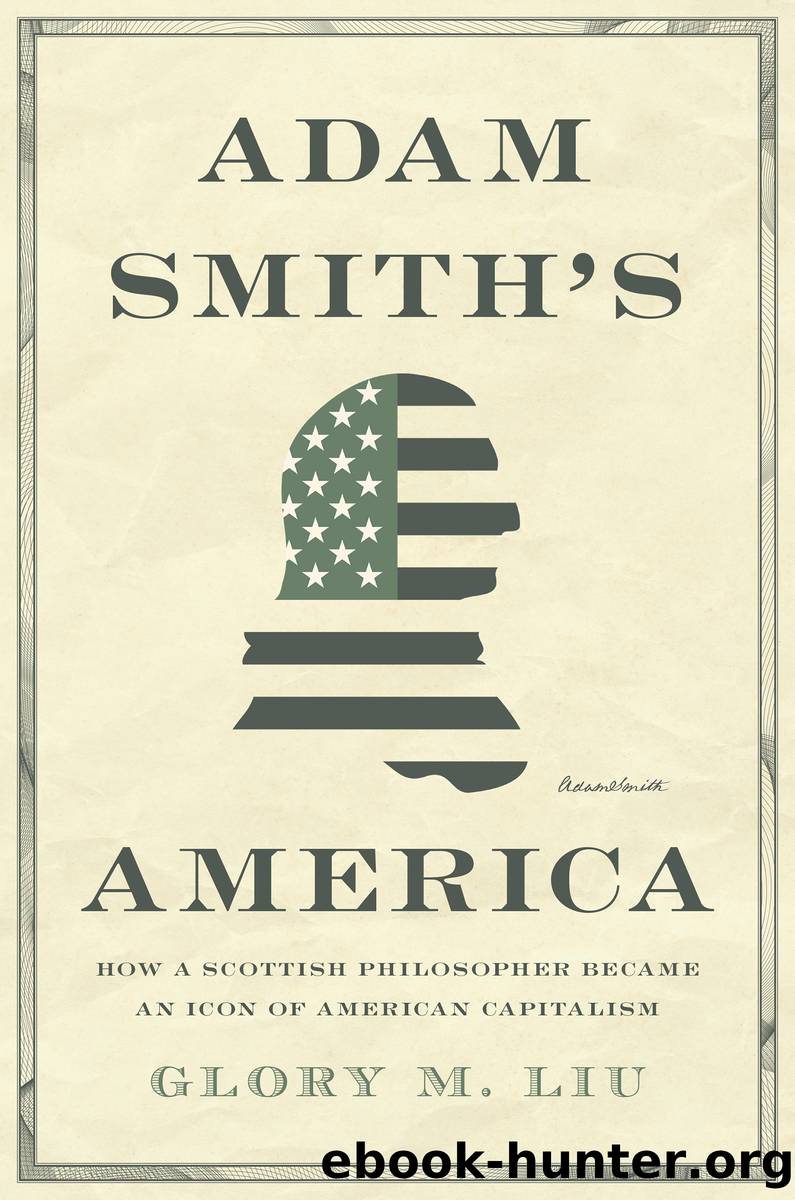Adam Smith's America by Glory M. Liu

Author:Glory M. Liu
Language: eng
Format: epub
Publisher: Princeton University Press
Published: 2022-07-22T00:00:00+00:00
Caldwell was charitable to the âloving and discriminating careâ with which Cannan treated the Lectures, but his review drew out implications of the discovery far beyond Cannanâs narrow purview.79 Whereas Cannan underplayed the position of the Lectures in Smithâs body of work, Caldwell elevated it. The Lectures did more than confirm the structure of Smithâs course in moral philosophy, Caldwell thought; they gave readers a better sense of the way in which Smith thought about the nature of politics. They showed that Smith was not content with providing a narrowly economistic view of the world nor did he see economic science at the foundation of a theory of mankind. Instead, the Lectures showed how Smith, âboth a philosopher and a scientific investigator and teacher,â saw how the principles of economic life were inseparable from and conditioned by âa still broader lawâthe evolution of the principle of Justice in human affairs.â Understanding Smithâs philosophy of justice thus provided a means for systemizing the whole of Smithâs corpus. This broader understanding of Smithâs lifework, with much of it devoted to the study of law and government, exposed the âabsurdity and inaccuracyâ of labeling Smith as a narrow-minded economist.80
The bolder claim that Caldwell made was that the Lectures placed Adam Smith among the greatest theorists of jurisprudence. Like The Wealth of Nations, Smithâs Lectures on Justice, Police, Revenue, and Arms were astounding in their âbreadth of conception.â Smithâs jurisprudence was not just free-standing positive discourse on public and private law, but also an ambitious attempt to relate the intellectual history of jurisprudenceâas traced through its great writers such as Grotius, Hobbes, and Pufendorfâto the history of human development. Caldwell argued that one had to place Smith among the many English writers seeking an alternative to social contract theorizing in the shadow of Hobbes.81 Smithâs twin concepts of authority and utility provided an alternative explanation for why men were induced to enter into civil society and submit to authority; political obligation stemmed not from a hypothetical social contract, but from opinion. Authority stemmed from four ânaturalâ sources: superior abilities, age, wealth, or birth. In the early stages of human society, for example, superior ability and age were the primary sources of political authority. Chieftains in a âwarlike societyâ were men of âsuperior strength,â while in more civilized societies leaders were chosen for âsuperior mental capacity.â As human society developed and property was introduced, wealth and birth became newâand increasingly importantâsources of authority. Utility, as Smith saw it, was some sense of the common good: âIt may sometimes be for my interest to disobey [the government] and to wish government overturned,â Smith wrote. âBut I am sensible that other men are of a different opinion from me and would not assist me in the enterprize. I therefore submit to itâs [sic] decision for the good of the whole.â82 Authority and utility were thus functions of a societyâs particular historical, social, and material circumstances.
According to Caldwell, this âgenetico-historical account of the different systems of political and social authorityâ was Smithâs distinctive contribution to the science of jurisprudence.
Download
This site does not store any files on its server. We only index and link to content provided by other sites. Please contact the content providers to delete copyright contents if any and email us, we'll remove relevant links or contents immediately.
International Integration of the Brazilian Economy by Elias C. Grivoyannis(111059)
The Radium Girls by Kate Moore(12028)
Turbulence by E. J. Noyes(8049)
Nudge - Improving Decisions about Health, Wealth, and Happiness by Thaler Sunstein(7706)
The Black Swan by Nassim Nicholas Taleb(7129)
Rich Dad Poor Dad by Robert T. Kiyosaki(6632)
Pioneering Portfolio Management by David F. Swensen(6300)
Man-made Catastrophes and Risk Information Concealment by Dmitry Chernov & Didier Sornette(6019)
Zero to One by Peter Thiel(5802)
Secrecy World by Jake Bernstein(4753)
Millionaire: The Philanderer, Gambler, and Duelist Who Invented Modern Finance by Janet Gleeson(4478)
The Age of Surveillance Capitalism by Shoshana Zuboff(4292)
Skin in the Game by Nassim Nicholas Taleb(4248)
The Money Culture by Michael Lewis(4207)
Bullshit Jobs by David Graeber(4190)
Skin in the Game: Hidden Asymmetries in Daily Life by Nassim Nicholas Taleb(4006)
The Dhandho Investor by Mohnish Pabrai(3764)
The Wisdom of Finance by Mihir Desai(3747)
Blockchain Basics by Daniel Drescher(3582)
